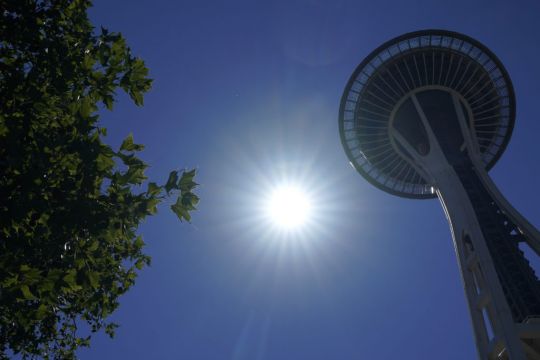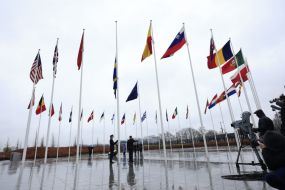The hottest day of an unprecedented and dangerous heatwave scorched the Pacific Northwest on Monday, with temperatures obliterating records that had been set just the day before.
Seattle hit 107 degrees Fahrenheit (42 Celsius) by mid-afternoon — well above Sunday’s all-time high of 104 F (40 C) — on the way to an expected high of 110 F (43 C).
Portland, Oregon, reached 115 F (46 C) after hitting new records of 108 F (42 C) on Saturday and 112 F (44 C) on Sunday.
The temperatures were unheard of in a region better known for rain, and where June has historically been referred to as “Juneuary” for its cool drizzle.
Several locations in the Northeast broke or tied record high temperatures for June 28th, but this heat is not as extreme as places in the Pacific Northwest like Seattle WA (107) and Portland OR (115), both of which broke their all time high temperature record again today. pic.twitter.com/Rdx1XHnJ3Q
Advertisement— NWS Eastern Region (@NWSEastern) June 29, 2021
Seattle’s average high temperature in June is around 70 F (21.1 C), and fewer than half of the city’s residents have air conditioning, according to US Census data.
The heat forced schools and businesses to close to protect workers and guests, including some places like outdoor pools and ice cream shops where people seek relief from the heat.
Covid-19 testing sites and mobile vaccination units were out of service as well.
The Seattle Parks Department closed one indoor community pool after the air inside became too hot.
The heatwave was caused by what meteorologists described as a dome of high pressure over the Northwest and worsened by human-caused climate change, which is making such extreme weather events more likely and more intense.
Zeke Hausfather, a scientist at the climate-data nonprofit Berkeley Earth, said that the Pacific Northwest has warmed by about three degrees F (1.7 degrees C) in the past half-century.
He said: “In a world without climate change, this still would have been a really extreme heatwave.
“This is worse than the same event would have been 50 years ago, and notably so.”

The blistering heat exposed a region with infrastructure not designed for it, hinting at the greater costs of climate change to come.
In Portland, light rail and street car service was suspended as power cables melted and as the heat strained the power grid.
Heat-related expansion caused road pavement to buckle or pop loose. Workers in tanker trucks in Seattle were hosing down drawbridges with water at least twice a day to keep them cool to prevent the steel from expanding in the heat and interfering with their opening and closing mechanisms.
In many cities in the region, officials opened cooling centres, including one in an Amazon meeting space in Seattle capable of holding 1,000 people.
Officials also reminded residents where pools, splash pads and cooling centres were available and urged people to stay hydrated, check on their neighbours and avoid strenuous activities.
The closure of school buildings halted programs such as meal services for the needy, child care and summer enrichment activities.
In eastern Washington state, the Richland and Kennewick school districts paused bus service for summer school because the vehicles are not air-conditioned, making it unsafe for students to travel in them.
Orchardists in central Washington tried to save their cherry crops from the heat, using canopies, deploying sprinklers and sending out workers in the night to pick.
Lytton, British Columbia has broken the Canada temperature record again today. Preliminary data has the temperature up to 47.5C, or 117.5F and this could still go a bit higher!!!
— NWS Eastern Region (@NWSEastern) June 28, 2021
Alaska Airlines said it was providing “cool down vans” for its workers at Seattle-Tacoma and Portland international airports, where temperatures on the ramp can be 20 degrees higher than elsewhere.
The heat wave stretched into the Canadian province of British Columbia, with the temperature in the village of Lytton reaching 115 F (46 C) Sunday afternoon, marking a new all-time high recorded in Canada.
In Multnomah County, Oregon, which includes Portland, health officer Dr Jennifer Vines said she believed there would be deaths from the heatwave, though how many remained to be seen.
Dr Vines said: “We are worried about elderly and we are certainly worried about people with frail health, but kids can also overheat easily.
“Even adults who are fit and healthy — in temperatures like these — have ended up in the emergency department.”







